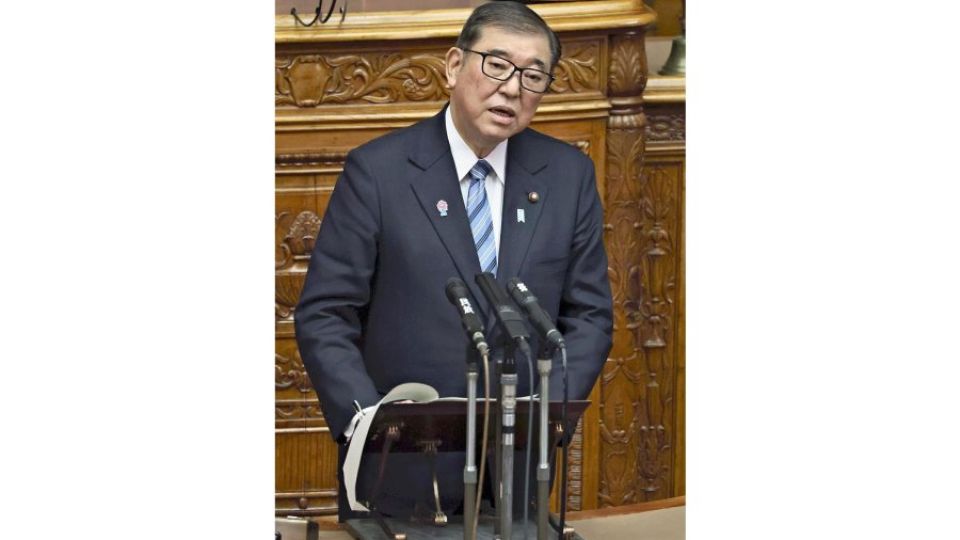February 14, 2025
TOKYO – The government faces some extremely tough negotiations as it seeks an exemption from the 25% tariff that the United States has decided to slap on imported steel and aluminum products.
The government has asked the United States for an exemption from the tariffs due to take effect in about one month, and some observers predict U.S. President Donald Trump will press Japan to strike a deal before these duties kick in. However, Trump is fixated on reversing U.S. trade deficits, so convincing him to grant an exemption will be far from easy. Japanese negotiators will have their work cut out for them.
At a press conference after a Cabinet meeting Wednesday, Economy, Trade and Industry Minister Yoji Muto explained why the government had requested an exemption. “Broad-based trade restrictions could have a major impact on the global economy and the entire multilateral trade regime based on World Trade Organization rules,” Muto said.
During the summit meeting between Prime Minister Shigeru Ishiba and Trump in Washington last week, the Japanese side successfully avoided any mention of raising tariffs on Japan. The possibility of this subject coming up during the bilateral talks had been the biggest fear of Japanese officials. During a plenary session of the House of Councillors on Wednesday, Ishiba said that the steel and aluminum tariffs were not discussed during the meeting.
However, many Japanese government officials were stunned just three days after the summit meeting when Trump charged ahead and formally announced that tariffs would be imposed on all steel and aluminum imports, including those from Japan. The government immediately requested an exemption and underlined Japan’s position of supporting global free trade. Although both leaders openly displayed their friendship at the meeting, it has become clear that the Japanese government and the Trump administration do not see eye-to-eye on this issue.
Levies ‘disadvantage’ for U.S.
Some observers believe the impact of these tariffs on Japan will be modest.
According to trade statistics, Japan exported 1.12 million tons of steel worth ¥302.6 billion to the United States in 2024. This accounted for only 1.4% of the value of Japan’s total exports to the United States. Currently, Japan can export 1.25 million tons per year to the United States without paying any tariffs, and products that meet certain quality standards also are spared from the penalties.
“The volume of our steel exports to the United States is low, so we think the direct impact [of the tariffs] will be limited,” a JFE Steel Corp. representative said.
Most steel products exported by major Japanese steelmakers to the United States cannot be produced there. Nippon Steel Corp. mainly exports products such as high-quality seamless pipes, for which its world-class technological prowess gives it a dominant share of the global market.
If U.S. companies are unable to find suitable replacements for these products, they will have no choice but to rely on imports saddled with the tariffs. This could push up production costs. According to Bloomberg **News**, Ford Motor Co. Chief Executive Officer Jim Farley criticized Trump’s tariff policy Tuesday and said the auto industry is seeing “a lot of cost, a lot of chaos.”
Japan Foreign Trade Council, Inc. Chairman Tatsuo Yasunaga similarly said at a press conference Wednesday, “I think jeopardizing essential economic activity through the imposition of political and manipulated tariffs could also become a disadvantage for U.S. economic circles.”
Trying to pump the brakes
Nevertheless, Trump insists that massive trade deficits drain U.S. wealth and indicate that other nations are exploiting the United States. Trump has made clear that his approach is to erect tariff barriers to drive out imported products and attempt to erase trade deficits.
The Japanese government is preparing to use negotiations to apply the brakes on the planned tariffs, because it believes that the situation will only escalate if the Trump administration’s tariff policies are left unaddressed. The agreement reached during the summit meeting that Japan would increase its imports of liquefied natural gas produced in the United States will be among the cards up the government’s sleeve during those negotiations. However, it remains unclear whether the United States will accept Japan’s request and grant an exemption given that the U.S. trade deficit with Japan is about $68.5 billion.
“I predict an exemption from the tariffs won’t be easily granted,” said Takahide Kiuchi, executive economist at Nomura Research Institute, Ltd. “Any upcoming negotiations will make progress only if the Japanese side can present concrete alternative plans.”

